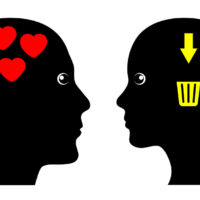Let’s say your beloved dog dies, and you are heartsick. As you tell different people of your loss, notice your emotional reactions and your gut feelings to the following responses: “I’m sorry for your loss.” “You’ll get over it in time.” “Your dog is in a better place now.” “Are you going to get another dog soon?” “It was her time.” The reason why none of those responses feel good is that they don’t honor your feelings of loss and sorrow. They’re not emotionally meaningful replies, and they don’t address your feelings at all.
Now notice how you would feel if you were to receive this response: “I am so sorry to hear this news. I would be devastated if my little Fluffy died. Tell me about your dog and your relationship with her. What will you miss about her? It doesn’t feel fair that we live so much longer than our dogs, does it? How are you coping?” That reply would feel meaningful, because it actually acknowledges your emotions. It would make us feel closer to the other person, because we feel someone is actually willing to hear our feelings and offer us empathy and compassion.
Authors Pat Love and Steven Stosny call this “stepping into the puddle” in their book: How to Improve Your Marriage Without Talking About It. Stepping into the puddle involves joining someone with our heartfelt presence, caring concern and participation. It allows another person to feel that they are not alone in their personal struggles, emotional quandaries or hurt feelings.
Now imagine if we were really good at doing this at home, especially with our spouses and children. It does not take a large leap to understand that this one relationship skill has the highest potential to transform our important relationships and assist us in feeling closer and more connected to each other.
Why don’t more people do this, or do it more often? Largely because they fear they will be stepping into an ocean instead of a puddle—and that they will drown in that ocean of emotion. But that’s not how emotions work. It doesn’t destroy you because someone else’s dog dies. But if you step into the puddle with them, you could help them walk out of that puddle, or walk out of the puddle together with them.
In a relationship, imagine the impact of the following statements: “I’m so proud of you for getting up every morning and going to work, especially when you don’t feel like it. You are my hero.” “Thank you for putting such effort and energy into making our meals. I feel very nurtured and cared for by you going this far out of your way.” “It’s amazing that you can work all day and still be such an attentive and loving mother. How do you do it?” “Thank you for being mine. I feel so very lucky for finding you.”
That’s stepping into the puddle in an entirely different way. It’s acknowledging someone’s effort or impact on you, instead of their hurt feelings. Is that an ocean you think you would drown in, or would willingly swim in?





